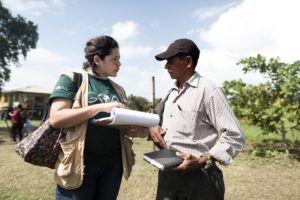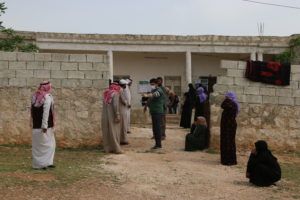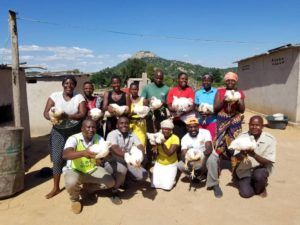 Stories
Stories
July 22, 2020 • 5 min read
As the world grapples with the unprecedented COVID-19 public health crisis, GOAL is committed to doing everything it can to protect some of the world’s most vulnerable populations in the Global South.
GOAL is calling for a community centred, integrated approach to be at the heart of the international response, and on the international community to urgently work together to prevent the loss of life and livelihoods by focusing on actions in six key areas.
Livelihoods, Resilience and Economic Recovery
COVID-19 threatens to roll back the development gains which have been so hard fought for by the most vulnerable communities across the globe. The global recession has direct repercussions in GOAL programme countries, and its impact further exacerbates increasing rates of hunger and poverty, as well as challenges including the desert locust outbreak, early droughts, conflict and insecurity. The International Labour Organization (ILO) has warned that 1.6 billon workers in the informal economy — about half the total global workforce — are at risk of losing their livelihoods.

GOAL Honduras supports local fishermen improve their business and livelihoods.
Access to predictable social assistance, in the form of cash or in-kind transfers, as well as specific labour-related guarantees, is key to mitigating the direct economic impacts of the pandemic on households and communities. Social protection will be an essential strategy to ensuring an inclusive recovery pathway, enhancing the ability of households to progressively rebuild their livelihoods, invest in economic activities and manage multiple risks.
In addition, 64 countries globally — including 30 in sub-Saharan Africa — spend more on repaying debt than investing in public health. Governments should not have to make impossible choices between repaying debt and providing necessary support and services in the wake of COVID-19. Cancelling debt for at least 2 years, will allow these countries to focus on implementing social safety nets and in the medium term building their societies back better.

GOAL supports livelihood with cash transfers such as in Gawlian refugee camp, Iraq
It is also clear that solutions to the current public health crisis cannot be found without taking climate and the environment into consideration. Now is a critical time to build economies and societies equipped to tackle structural inequalities, and to re-organize our societies and global economic systems so there is a sustainable future for all on our planet. The SDGs call for the world to ‘Leave No-One Behind’ is more relevant than ever before. The SDGs provide the foundation and principles to ensure any future recovery is sustainable and puts people at the heart of social and economic development.
GOAL supports vulnerable communities through a range of measures aimed at stabilizing critical market systems and enabling continuity of micro and small enterprises in the informal sector. Measures prioritised include access to basic needs through cash transfers for vulnerable households, Infection Prevention Control (IPC) in public spaces, such as food and animal markets, remote monitoring of food and commodity prices and market information dissemination.
In Uganda, South Sudan, Ethiopia and Honduras, GOAL is increasingly supporting grants to small businesses along the food, agriculture and hygiene product supply chain, to maintain and protect their existing production and distribution systems, critical to local economies and peoples access to essential good and service. Access to financial services is critical for cash transfers and the protection of assets as well as business continuity to support small business to adapt their business models in the context of COVID 19. Now more than ever, support from governments is needed to ensure the most vulnerable people are not pushed further into chronic and extreme poverty.
GOAL is asking that:
- Governments quickly move to implement social protection programmes, including cash assistance, to stop the most vulnerable individuals and families from falling further into poverty and supporting households to progressively rebuild their livelihoods.
- All debts payable in 2020 and 2021 must be cancelled for the poorest countries. The decision to pause debt repayment by the G20 until the end of 2020 is welcome, but it is now time for all lending institutions to take the bold step of cancelling this debt until at least the end of 2021.
- As we are planning the Covid-19 recovery, this is an opportunity to build back better societies and economies. Recovery measures must hold the SDG principles at heart to tackle structural inequalities, climate change and protect the environment to help build sustainable communities and economies. They must also address the climate injustices faced by the world’s poorest by ensuring adequate financing for resilience building programmes.
GOAL supporting livelihoods in Zimbabwe
GOAL is working closely with Village Savings & Loan Associations (VSLA’s) in Zimbabwe on developing small businesses.
One group which has benefitted is the Kuwirirana VSLA in Buhera District in eastern Zimbabwe, which has built a thriving chicken business after receiving training from GOAL on business management, accounts and chicken production.
GOAL linked the group with the Zimbabwe Women’s Microfinance Bank and they successfully applied for an initial loan of $12,000 (Zimbabwean dollars) which bought them 150 Broiler chicks and feed. Since then, 45 broilers worth $4 500 have been sold to local markets. The group also constructed a chicken run to expand their business enterprise.

The Kuwirirana VSAL group pose with the broiler chicken they acquired through a loan from the Zimbabwe Women Microfinance Bank.
“We didn’t know how to rear broilers and didn’t think it would work as a business. Our future looks bright now, thank you GOAL,” Lynette Munotengwa, chairperson of the group which has 15 community members.
The Kuwirirana VSLA is one of 20 groups from Chipinge and Buhera Districts that received training and bank loans amounting to $180,357 (Zimbabwean dollars) in 2019.
